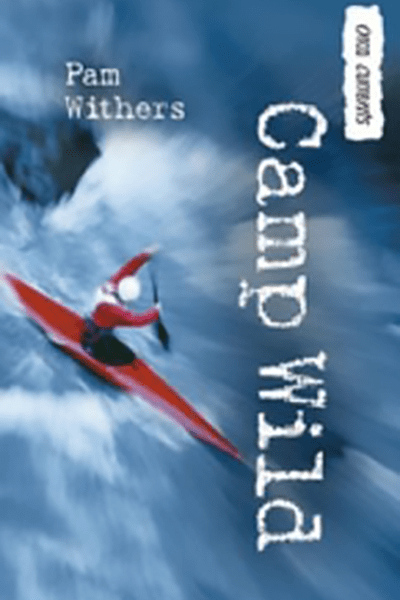
Camp Wild
Does Wilf have what it takes to survive the river?
Wilf is convinced his parents want nothing to do with him. They both have demanding careers and are never home. When he isn’t in school, he is left to his own devices or shipped away to camp. But, at fifteen, Wilf is adamant that he is too old for summer camp.
When his parents ignore his protests and ship him off anyway, he knows how he will get their attention: He will escape from camp by canoe and spend the rest of his vacation alone in the woods, proving to his parents he deserves his independence. His plan begins to unravel when his cabin mate forces Wilf to take him along. Things go from bad to worse when a younger camper follows them down the dangerous white water and they all end up in a fight for their lives against the unforgiving river.
Click here to learn about the story behind the book!
This is my most humorous book by far, and try as I might since, I’ve never managed to concoct another character as bitingly sarcastic and full of zingy one-liners as Wilf. That makes this one of my favorite books, and reading from it always goes over well during school visits.
I also think the two main characters’ issues – Wilf’s parents are workaholics and Herb’s are over-hovering sorts – are real.
Herb is also an annoying geek:
His round face and innocent expression make him a candidate for a Boy Scouts poster. He holds his slightly lumpy body as awkwardly as a heron emerging from an oil slick. Adventurous this guy is definitely not, I decide.
Herb: “I’ve never camped before, so I kind of need someone to show me the ropes.”
Wilf: Ropes, eh? I picture myself handing him a rope shaped like a noose.
Of course, running a summer camp for six years for teens learning whitewater kayaking gave me plenty of material to work with. And since whitewater paddling has been a long-time passion of mine, the plot line was fun and easy to build. I also spent more than a few summers at camps in my youth, sometimes canoeing under the instruction of my camp-manager parents. And yes, stealing food is always one of campers’ favorite sports.
After canoeing and kayaking class comes lunch, where my main project is spiriting away as many cans of food as will fit up my sleeves, down my shorts or under my baseball cap. The trick is getting stuff out without a soul seeing me. This, as it turns out, is where I truly excel. Although I don’t expect to be around for Camp Wild’s last-day awards ceremony, I reckon I’d ace the blue ribbon for food-supplies diversion if I were.
Getting kitchen patrol is like winning the lottery at Camp Wild. Even though it means scrubbing pots for an hour, it also means potential access to the pantry’s box of chocolate bars. Never mind that Cook makes you whistle the whole time you are in the pantry. (That way you can’t stuff anything in your mouth.) She also checks your pockets when you come out. But the best-informed campers know she does not check socks or hats.
When my husband was a kid, his mother made him whistle whenever he entered the pantry to get something for her. J
Then there’s the junior counsellor Claire, who adds to the fun in the book:
Claire is on shore fitting out the munchkins in puffy orange lifejackets. I admire her pierced navel from afar, not for the first time.
Claire gives me a glowing smile that makes me think I’m going to capsize in my canoe right then and there and need a deep-water rescue if not mouth-to-mouth resuscitation.
Herb was named after my long-time kayaking pal Herb Whitehead. I presented the book to him while he was in the hospital; he passed away some time later. I will forever miss his high energy, sense of fun and heart of gold.
The book is dedicated to my childhood nanny, Lucille Dougherty, who read it shortly before she turned 100. When she finished it, she turned to me and said, “This doesn’t sound like you at all!” Assuming she meant Wilf’s sarcasm and considerable attitude, I took it as a compliment.
Camp Wild was the first of three (so far) adventure novels I’ve written for Orca Books, which specializes in novels for reluctant readers, also known as hi-lo or quick reads books. I have always admired Orca’s dedication to this line, which surely keeps many youths from falling off the reading wagon, or tempts them back on. Orca even has hi-lo books for adults now.
